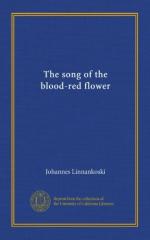“The loveliest hour?” said the fuchsia warmly. “Why, now, give me the night—’tis the best of all.”
“I love it too,” answered the balsamine. “Whispering here as we are now, alone in the dark, only knowing the other is near, only seeing the gleam of each other’s eyes. But the morning, too, is beautiful—at sunrise, when the dewdrops glisten and the leaves quiver in the wakening breeze.”
“True, that is true. All times are beautiful, all life. The morning, when the cock crows, and the birds twitter, and the children newly washed come out to play in the yard. The day, too, when the sunbeams dance over the floor, and the haymakers come from the fields, with sweat on their brows, home to the midday meal. And the evening, when the shadows lengthen, and the cows come home, with their bells tinkling along the fringe of the wood. But there’s nothing can compare with night—’tis at night we find ourselves, and only then.”
“Find ourselves...?” echoed the balsamine. “Ah, yes, I understand....”
“Ourselves—and that faint song of the heart that is never heard in the bright fullness of day,” the fuchsia went on. “All day we belong to the world, sharing all things in common, having nothing of our own. But when the night falls, then our own time is near. Softly it steals through the forest, patiently waits in a corner within doors, trembles mysteriously in the air, and wakes to life all that has slept in us through the day. It comes to us with a soft glow, in a swooning fragrance of flowers. All things else are sleeping, none are astir save those....”
A woman’s arm showed faintly white through the gloom.
“All save those...?” whispered the balsamine.
“Save those who find themselves and waken into bloom.”
* * * * *
“Pansy—my wonderful delight—my love! You are like the night—witching, ensnaring, all the mystery of a summer night, when the summer lightning gleams.”
“I never knew till now what youth is, what love is. Great and beautiful, coming like a king in a golden chariot, beckoning, calling, leading us on.”
“Why are you trembling, love? And your hands are hot, and your eyes—what are they saying?”
“I don’t know—it’s very hot. No, no, it’s only that I’m too happy....”
“Too happy?”
“No, no. I don’t know what it is. Only I wish....”
“What is it? Tell me.”
“I can’t—I don’t know what it is. I....”
“But tell me—can’t you tell me what it is?”
“I can’t say it. I—I’m frightened.”
“Frightened? Why—have I frightened you?”
“You?—no, how could you? Only....”
“Tell me, then. Tell me. Only a word, and I shall know.”
“I’m frightened—no, I can’t say it. Only—Oh, I love you, if you knew how I love you....”
* * * * *




